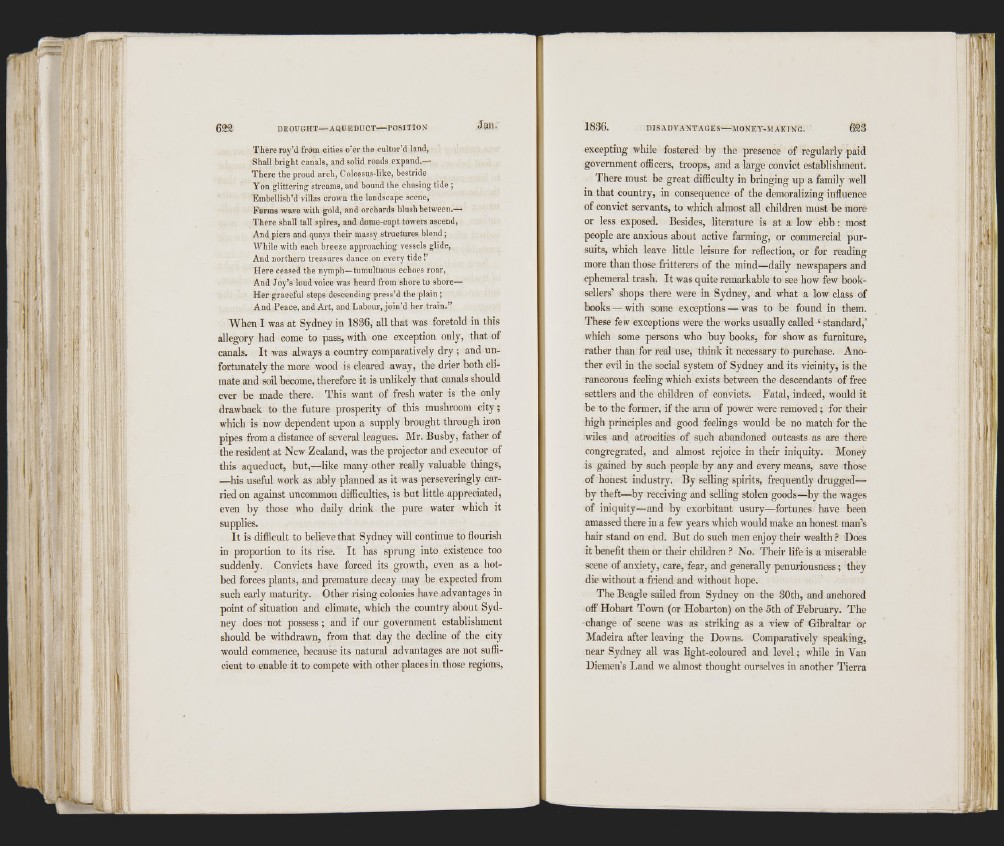
'! i
( i 'I I
4ii
There ray’d frdm cities o’er the cultur’d land,
Shall bright canals, and solid roads expand.—
There the proud arch. Colossus-like, bestride
Yon glittering streams, and hound the chasing tide ;
Embellish’d villas crown the landscape scene.
Farms wave with gold, and orchards blush between.—
There shall tall spires, and dome-eapt towers ascend,
And piers and quays their massy structures blend;
While with each breeze approaching vessels glide,
And northern treasures dance on every tide ”
Here ceased the nymph—tumultuous echoes roar.
And Joy’s loud voice was heard from shore to shore—
Her graceful steps descending press’d the plain ;
And Peace, and Art, and Labour, join’d her train.”
When I was at Sydney in 1836, all that was foretold in this
allegory had come to pass, with one exception only, that of
canals. I t was always a country comparatively dry ; and unfortunately
the more wood is cleared away, the drier hoth climate
and soil hecome, therefore it is unlikely that canals should
ever he made there. This want of fresh water is the only
drawback to the future prosperity of this mushroom city;
which is now dependent upon a supply brought through iron
pipes from a distance of several leagues. Mr. Busby, father of
the resident at New Zealand, was the projector and executor of
this aqueduct, but,—like many other really valuable things,
—^his useful work as ably planned as it was perseveringly carried
on against uncommon difficulties, is hut little appreciated,
even by those who daily drink the pure water which it
supplies.
I t is difficult to believe that Sydney will continue to flourish
in proportion to its rise. I t has sprung into existence too
suddenly. Convicts have forced its growth, even as a hotbed
forces plants, and premature decay may be expected from
such early maturity. Other rising colonies have advantages in
point of situation and climate, which the country ahout Sydney
does not possess ; and if our government establishment
should be withdrawn, from that day the decline of the city
would commence, because its natural advantages are not sufficient
to enable it to compete with other places in those regions.
•A«
excepting while fostered by the presence of regularly paid
government officers, troops, and a large convict establishment.
There must be great difficulty in bringing up a family well
in that country, in consequence of the demoralizing influence
of convict servants, to which almost all children must be more
or less exposed. Besides, literature is at a low ebb; most
people are anxious about active farming, or commercial pursuits,
which leave little leisure for reflection, or for reading
more than those fritterers of the mind—daily newspapers and
ephemeral trash. It was quite remarkable to see how few booksellers’
shops there were in Sydney, and what a low class of
books — with some exceptions — was to be found in them.
These few exceptions were the works usually called ‘ standard,’
which some persons who buy books, for show as furniture,
rather than for real use, think it necessary to purchase. Another
evil in the social system of Sydney and its vicinity, is the
rancorous feeling which exists between the descendants of free
settlers and the children of convicts. Fatal, indeed, would it
be to tbe former, if the arm of power were removed; for their
high principles and good feelings would be no match for the
wiles and atrocities of such abandoned outcasts as are there
congregrated, and almost rejoice in their iniquity. Money
is gained by such people by any and every means, save those
of honest industry. By selling spirits, frequently drugged—
by theft—by receiving and selling stolen goods—by the wages
of iniquity—and by exorbitant usury—fortunes have been
amassed there in a few years which would make an honest man’s
hair stand on end. But do such men enjoy their wealth ? Does
it benefit them or their children ? No. Their life is a miserable
scene of anxiety, care, fear, and generally penuriousness; they
die without a friend and without hope.
The Beagle sailed from Sydney on the SOth, and anchored
off Hobart Town (or Hobarton) on the 6th of February. The
change of scene was as striking as a view of Gibraltar or
Madeira after leaving the Downs. Comparatively speaking,
near Sydney all was light-coloured and level; while in Van
Diemen’s Land we almost thought ourselves in another Tierra
1.1
.i .iK : , :-f
I iil|
C
Ic
It! 'I
I
;?■ 1.